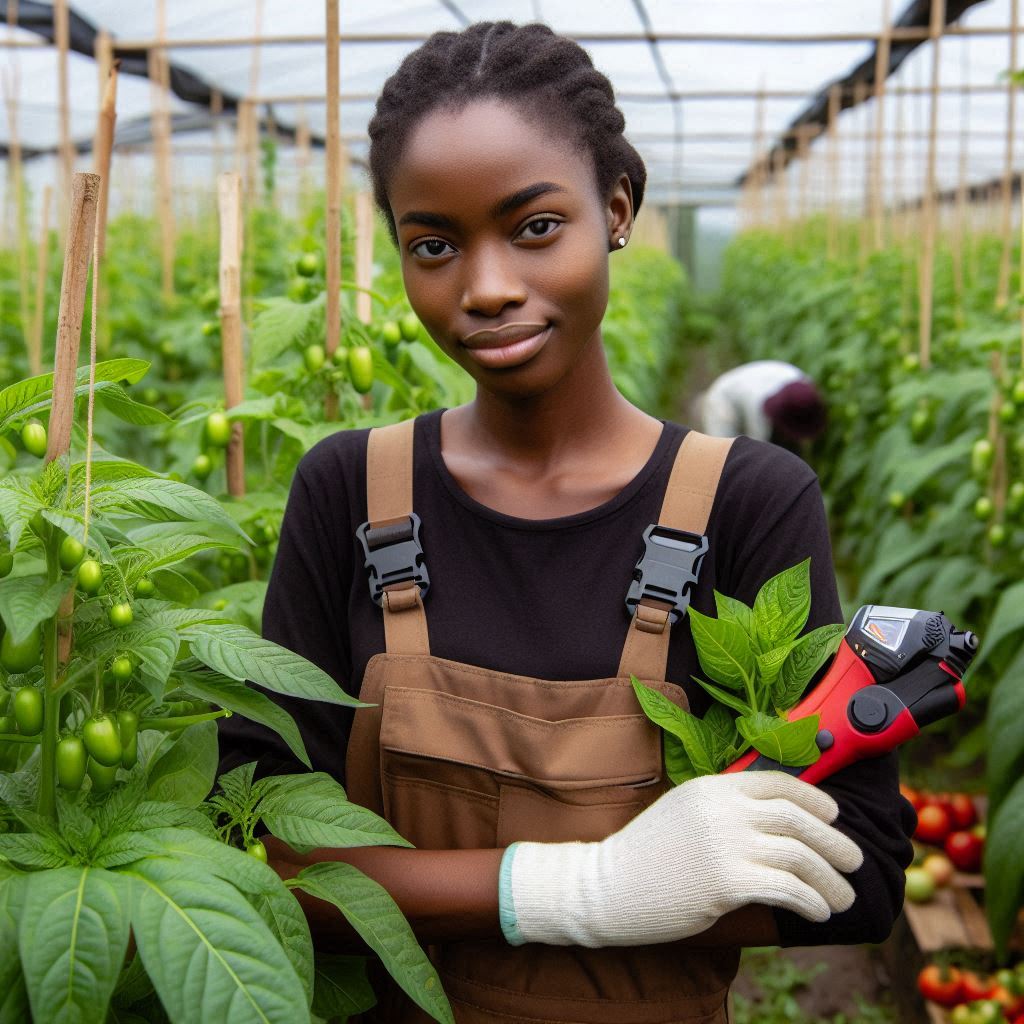Introduction
Innovative plant breeding projects in Nigerian universities are making significant strides in transforming agriculture and enhancing food security.
These projects address the nation’s agricultural challenges by developing resilient crop varieties, improving yields, and promoting sustainable farming practices.
The importance of these initiatives cannot be overstated as they play a pivotal role in ensuring a stable food supply and improving farmers’ livelihoods.
Universities are at the forefront of driving research and innovation in plant breeding.
By leveraging advanced techniques such as genetic modification, marker-assisted selection, and tissue culture, these institutions are pioneering solutions to combat pests, diseases, and climate change impacts.
The work being done in these academic settings is crucial for the long-term sustainability of Nigeria’s agricultural sector.
Moreover, the involvement of universities in plant breeding research fosters a collaborative environment where students, researchers, and industry experts can work together.
This collaboration accelerates the development of new technologies and methods that can be quickly implemented on the ground. By training the next generation of plant breeders and scientists, universities ensure a continuous flow of knowledge and expertise into the agricultural sector.
In this blog, we will delve deeper into the innovative plant breeding projects being conducted in Nigerian universities. We will highlight specific examples of successful initiatives, their methodologies, and their impacts on local farming communities.
Understanding these projects’ significance and outcomes will shed light on the vital role universities play in advancing Nigeria’s agricultural future and securing its food systems.
Overview of plant breeding projects in Nigerian universities
Provide an Overview of the Current State of Plant Breeding Projects in Nigeria
Plant breeding projects in Nigerian universities are advancing agriculture by developing resilient and high-yield crop varieties. Universities such as the University of Ibadan, Ahmadu Bello University, and Obafemi Awolowo University are leading these efforts.
Researchers focus on essential crops like maize, rice, cassava, and yams. Their goal is to enhance yield, disease resistance, and climate adaptability.
Advanced techniques like genetic modification, marker-assisted selection, and tissue culture are commonly used to achieve these objectives.
Challenges and Opportunities Facing Plant Breeding Research in the Country
Despite the progress, plant breeding research in Nigeria encounters significant challenges. Limited funding restricts the scope and scale of projects.
Research facilities often lack state-of-the-art equipment and resources, hampering progress. The regulatory environment can be cumbersome, slowing down the approval and dissemination of new varieties.
There is also a need for more trained plant breeders and researchers to sustain and expand these efforts.
However, these challenges present opportunities for growth and improvement. Increased investment from government and private sectors can bolster research capabilities.
Upgrading infrastructure and acquiring modern equipment will enhance the quality of research. Streamlining regulatory processes can accelerate the deployment of innovative crop varieties to farmers.
Additionally, developing educational programs to train more plant breeders will ensure a continuous supply of skilled professionals in the field.
Importance of Collaboration Between Universities, Research Institutions, and the Agricultural Sector
Collaboration between universities, research institutions, and the agricultural sector is crucial for the success of plant breeding projects. Such partnerships can pool resources, share knowledge, and drive innovation.
Universities provide scientific expertise and research facilities, while research institutions offer additional resources and technical support. The agricultural sector supplies practical insights and tests new varieties in real-world conditions.
For example, partnerships between Nigerian universities and international research organizations like the International Institute of Tropical Agriculture (IITA) have yielded significant results.
These collaborations have led to the development of improved crop varieties that are now being adopted by farmers across the country.
Additionally, collaboration with local agricultural extension services ensures that new technologies and crop varieties reach the farmers who need them most.
The importance of plant breeding research in Nigeria cannot be overstated. It directly impacts food security, economic stability, and environmental sustainability.
By developing crops that can withstand pests, diseases, and climate change, plant breeding projects contribute to a more resilient agricultural system. This, in turn, supports the livelihoods of millions of farmers and ensures a stable food supply for the nation.
Basically, plant breeding projects in Nigerian universities are vital for the future of agriculture in the country. Despite facing challenges, there are numerous opportunities to enhance and expand these efforts.
Collaboration between universities, research institutions, and the agricultural sector is key to driving innovation and ensuring the success of these initiatives.
By investing in plant breeding research, Nigeria can achieve sustainable agricultural growth and secure its food systems for future generations.
Read: Innovations in Nigerian Horticulture
Case Study of Successful Plant Breeding Project
A standout plant breeding project at the University of Ibadan focuses on developing improved cassava varieties. This initiative aims to enhance yield, disease resistance, and nutritional content, significantly benefiting Nigerian agriculture.
Goals and Objectives of the Project
The project’s primary goal is to produce cassava varieties with higher yields and better disease resistance. It also aims to improve the nutritional content of cassava, addressing malnutrition issues in Nigeria.
Enhancing the crop’s adaptability to various climatic conditions is another critical objective.
Methodologies and Techniques Used in the Project
Researchers employed several advanced methodologies and techniques in this project. Genetic modification was used to introduce traits for disease resistance and increased yield.
Marker-assisted selection helped identify and select plants with desirable traits, speeding up the breeding process. Tissue culture techniques were also utilized to propagate the improved cassava varieties rapidly and uniformly.
Field Trials and Testing
Field trials played a crucial role in the project’s success. These trials were conducted in different agro-ecological zones across Nigeria to test the performance of the new cassava varieties under various conditions.
Researchers monitored factors like growth rate, yield, disease resistance, and nutritional content during these trials.
Collaboration and Support
The project benefited from extensive collaboration with international research organizations, such as the International Institute of Tropical Agriculture (IITA).
These partnerships provided additional resources, technical expertise, and access to advanced research facilities. Funding from both government and private sectors also supported the project’s progress.
Results and Impact of the Project
The project achieved remarkable results. The newly developed cassava varieties showed a significant increase in yield, up to 50% higher than traditional varieties.
These varieties also exhibited strong resistance to major diseases like cassava mosaic virus and cassava brown streak disease. Additionally, the nutritional content of the improved cassava was enhanced, with higher levels of essential nutrients such as vitamins and minerals.
Impact on Agriculture and Food Production
The impact of this project on agriculture and food production in Nigeria has been substantial. The higher-yielding, disease-resistant cassava varieties have led to increased productivity for farmers.
This has translated into higher incomes and improved food security for many rural households. The enhanced nutritional content of cassava also helps combat malnutrition, contributing to better health outcomes for the Nigerian population.
This successful plant breeding project at the University of Ibadan exemplifies the transformative potential of innovative research in Nigerian agriculture.
By setting clear goals, utilizing advanced methodologies, and fostering collaborations, the project achieved significant breakthroughs.
The improved cassava varieties developed through this initiative have not only boosted agricultural productivity but also addressed critical issues of disease resistance and nutritional quality.
Encouragement for Future Projects
This case study underscores the importance of continued investment and support for plant breeding projects in Nigerian universities. Such initiatives are vital for driving agricultural innovation, ensuring food security, and promoting economic growth.
Aspiring plant breeders and researchers are encouraged to pursue similar projects, leveraging the lessons and successes from this exemplary initiative to create even greater impacts in the future.
Read: Horticulture and Food Security in Nigeria
Collaboration and partnerships
- Exploring the importance of collaboration between universities, government agencies, and industry partners in advancing plant breeding research.
- Highlighting successful partnerships that have led to innovative plant breeding projects in Nigerian universities.
- Discussing the benefits of knowledge sharing and resource pooling in driving innovation in plant breeding.
Importance of Collaboration
Collaboration between universities, government agencies, and industry partners in plant breeding research is crucial for several reasons.
Firstly, by working together, these entities can combine their expertise, resources, and infrastructure to tackle complex challenges in plant breeding that no single entity could address alone.
Additionally, collaboration allows for the sharing of knowledge, best practices, and cutting-edge technologies, leading to accelerated innovation and progress in the field.
Successful Partnerships in Nigerian Universities
Nigerian universities have witnessed numerous successful partnerships that have resulted in groundbreaking plant breeding projects.
For example, collaborations between universities and industry partners have led to the development of high-yielding and disease-resistant crop varieties that have significantly improved food security in the country.
Government agencies have also played a crucial role in supporting these partnerships through funding and policy support.
Benefits of Knowledge Sharing and Resource Pooling
Knowledge sharing and resource pooling are essential components of successful collaborations in plant breeding.
By sharing research findings, methodologies, and data, universities, government agencies, and industry partners can collectively leverage their strengths and address research gaps more effectively.
Resource pooling, including sharing of infrastructure, equipment, and funding, allows for cost-effective research and development of innovative plant breeding solutions.
Read: Traditional vs Modern Horticulture in Nigeria
Challenges and Solutions
- Identifying main challenges facing plant breeding projects in Nigerian universities.
- Discussing potential solutions and strategies to overcome these challenges.
- Highlighting the importance of investment in infrastructure, technology, and human resources to support plant breeding research.
Main Challenges in Plant Breeding Projects:
- Lack of adequate funding: Plant breeding projects require significant financial resources to conduct research, purchase equipment, and hire skilled personnel.
- Limited infrastructure: Many Nigerian universities lack modern laboratories, greenhouses, and research facilities essential for plant breeding studies.
- Shortage of trained professionals: There is a scarcity of researchers and experts in plant breeding, limiting the progress of projects in universities.
- Inadequate technology: Outdated technology hinders the efficiency and effectiveness of plant breeding initiatives in Nigerian universities.
- Poor collaboration and networking: Limited partnerships with industry, government agencies, and international organizations restrict the exchange of knowledge and resources.
Potential Solutions and Strategies
- Increased funding: Government support, private sector partnerships, and grants can boost financial resources for plant breeding projects in universities.
- Infrastructure development: Investing in modern facilities, equipment, and technology will enhance the research capabilities of universities.
- Capacity building: Providing training programs, workshops, and scholarships can address the shortage of skilled professionals in plant breeding.
- Technology upgrade: Upgrading laboratories, acquiring advanced software, and implementing modern techniques will improve the efficiency of research projects.
- Collaboration and partnerships: Establishing strong networks with industry, government, and international organizations can promote knowledge sharing and resource mobilization.
Importance of Investment in Infrastructure, Technology, and Human Resources
Investment in infrastructure, technology, and human resources is crucial for the success and sustainability of plant breeding projects in Nigerian universities.
- Infrastructure: Modern laboratories, greenhouses, and research facilities provide researchers with the necessary tools and environment to conduct experiments and studies effectively.
- Technology: Advanced equipment, software, and techniques improve the accuracy, speed, and quality of plant breeding research, leading to faster outcomes and better results.
- Human resources: Skilled researchers, scientists, and technicians play a vital role in driving innovation and breakthroughs in plant breeding, making investment in training and capacity building essential.
Overall, investment in infrastructure, technology, and human resources is essential to overcome the challenges facing plant breeding projects in Nigerian universities and to foster the growth and development of this critical field of research.
Read: Horticultural Tools and Equipment in Nigeria

Impact on agriculture and food security
- Discuss the potential impact of innovative plant breeding projects on agriculture and food security in Nigeria.
- Highlight how these projects can improve crop yield, quality, and resilience to climate change.
- Emphasize the role of universities in training the next generation of plant breeders and agricultural scientists.
Potential impact of innovative plant breeding projects on agriculture and food security in Nigeria
Plant breeding projects in Nigerian universities have the potential to revolutionize agriculture and enhance food security in the country.
These projects focus on developing new crop varieties that are resistant to pests and diseases, drought-tolerant, and high-yielding.
By introducing innovative breeding techniques, researchers aim to address the challenges facing Nigerian farmers and increase overall agricultural productivity.
How these projects can improve crop yield, quality, and resilience to climate change
Improving crop yield is a primary goal of innovative plant breeding projects. By developing high-yielding varieties, researchers can help farmers increase their output and meet the growing demand for food in Nigeria.
These new crop varieties are also bred for improved quality, making them more attractive in the market and ensuring higher returns for farmers.
In addition to increasing yield and quality, innovative plant breeding projects focus on developing crop varieties that are resilient to climate change.
With unpredictable weather patterns affecting agricultural production, climate-resilient crops are essential for ensuring food security in Nigeria.
By breeding varieties that can withstand drought, flooding, or extreme temperatures, researchers are helping farmers adapt to changing environmental conditions and maintain their livelihoods.
The role of universities in training the next generation of plant breeders and agricultural scientists
The role of universities in these projects is crucial, as they play a key role in training the next generation of plant breeders and agricultural scientists.
By providing students with hands-on experience in plant breeding and modern biotechnological techniques, universities are equipping them with the skills needed to drive innovation in agriculture.
This ensures a sustainable pipeline of talent that can continue to advance the field of plant breeding and contribute to food security in Nigeria.
Overall, innovative plant breeding projects in Nigerian universities have the potential to have a significant impact on agriculture and food security.
By improving crop yield, quality, and resilience to climate change, these projects are helping to ensure a sustainable and secure food supply for the growing population of Nigeria.
Additionally, by training the next generation of plant breeders and agricultural scientists, universities are laying the foundation for continued innovation and progress in the field of agriculture.
Conclusion
In closing, the innovative plant breeding projects showcased in Nigerian universities have demonstrated great potential for agricultural development and food security in the country.
The collaboration between researchers, students, and industry partners has led to the creation of new and improved crop varieties that are more resistant to diseases, pests, and adverse environmental conditions.
These projects have not only increased crop yields but have also enhanced the nutritional value of the crops, addressing malnutrition and enhancing the overall health of the population.
The importance of continued support and investment in plant breeding research cannot be overstated. It is crucial for driving agricultural development, ensuring food security, and improving the livelihoods of farmers in Nigeria.
Therefore, policymakers, funding agencies, and stakeholders in the agricultural sector must recognize the significance of innovative plant breeding projects and allocate resources towards their sustainability and expansion.




